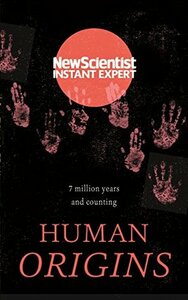Take a photo of a barcode or cover
5 reviews for:
Human Origins: 7 million years and counting (New Scientist Instant Expert)
New Scientist
5 reviews for:
Human Origins: 7 million years and counting (New Scientist Instant Expert)
New Scientist
informative
medium-paced
informative
medium-paced
An all encompassing look at human evolution.
The audio book was a joy to listen to and has definitely sparked interest in further study. Ideas surrounding the order in which remains of our hominin ancestors were discovered dictating the way we view our evolutionary lineage is perhaps one of the most intriguing aspects of the conclusion.
The audio book was a joy to listen to and has definitely sparked interest in further study. Ideas surrounding the order in which remains of our hominin ancestors were discovered dictating the way we view our evolutionary lineage is perhaps one of the most intriguing aspects of the conclusion.
informative
medium-paced
I saw this book on sale in a bookshop for like $2 and I simply had to get. A full dive into the history of humanity (from like wayyyyyy back) until modern homo sapiens and the anthropocene today are in full tilt. This book was an excellent survey into the current state of evolutionary anthropology and the ever-changing landscape of the story of human evolution. It's a must read if you think the topic is cool - I had no idea that the evolutionary tree has been basically ripped apart in the last decade at it's quite unclear exactly how we came to be!
A few mind-blowing things I learned(in my rookie opinion):
1. It's quite possible that neanderthals were just as intelligent and social as humans - in fact, some 9of the earliest evidence of art is from potential neanderthal sites. Homo Sapiens have interbred with them and part of the reasons they may have died out are due to limited genetic diversity (too much inbreeding from small populations) or that they simply integrated into homo sapien lineages. In many areas, they coexisted with us for 1000s of years, so it's unlikely they were simply killed by us.
2. It's unclear if there was one distinct homo sapien lineage - it's potentially possible that we evolved in several strands in eurasia or africa/ and were close enough to interbreed.
3. It is beyond incredible to me that creatures in the homo genus (some before homo sapiens!) made it to australia and the indonesian islands AT LEAST 70 - 100 thousand years ago. Like WHAT?? how!? huge swatchs of ocean and disparate environments. Just insane!
A few mind-blowing things I learned(in my rookie opinion):
1. It's quite possible that neanderthals were just as intelligent and social as humans - in fact, some 9of the earliest evidence of art is from potential neanderthal sites. Homo Sapiens have interbred with them and part of the reasons they may have died out are due to limited genetic diversity (too much inbreeding from small populations) or that they simply integrated into homo sapien lineages. In many areas, they coexisted with us for 1000s of years, so it's unlikely they were simply killed by us.
2. It's unclear if there was one distinct homo sapien lineage - it's potentially possible that we evolved in several strands in eurasia or africa/ and were close enough to interbreed.
3. It is beyond incredible to me that creatures in the homo genus (some before homo sapiens!) made it to australia and the indonesian islands AT LEAST 70 - 100 thousand years ago. Like WHAT?? how!? huge swatchs of ocean and disparate environments. Just insane!
A super interesting overview of the history of humankind. Explained through following the fossil record, it offers a more nuanced understanding of human evolution, in particular its graduality and relation to other species. It highlights groundbreaking developments like bipedalism, cooking, agriculture, language and culture

